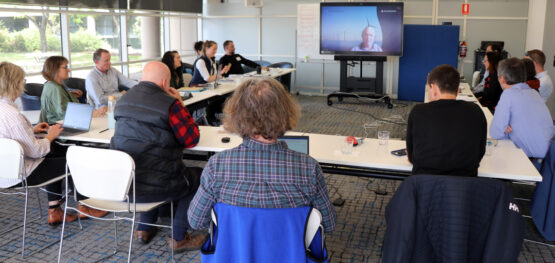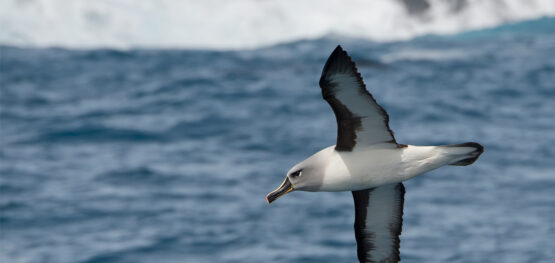Newsletter
6 June 2025
This research update brings together Marine and Coastal Hub projects and outputs relating to offshore wind farm environmental research in Australia.
The hub and its research partners have been working in this area since 2023 with a focus on key environmental factors considered relevant to offshore wind farm construction, operation and decommissioning in Australian waters.
Together we are:
- bringing people together (researchers, regulators, proponents, consultants) to review existing data, information and methods;
- collating, filtering and presenting this material in reports, data inventories, and online mapping portals;
- conducting species and ecosystem modelling to identify potential population-level impacts and cumulative risk; and
- identifying requirements for research and environmental monitoring.
Hub projects respond to research needs identified by the Department of Climate Change, Energy, the Environment and Water (DCCEEW) and the National Offshore Petroleum Safety and Environmental Management Authority (NOPSEMA). The projects are guided by the DCCEEW document Key environmental factors for offshore windfarm environmental impact assessment under the Environmental Protection and Biodiversity Conservation Act 1999.
Two hub projects are completed and three are active. The following information includes links to reports and collated datasets.
Completed projects
Project 3.3 – Guiding the sustainable development of offshore renewables and other emerging marine industries in Australia
This project was led by hub research partners the Australian Institute of Marine Science and Deakin University. It identified information and methods relevant to the environmental assessment of offshore wind farms during the planning, construction, operation and decommissioning phases. This included regional-scale data reviews for oceanography, seabed habitats and threatened species across all six offshore wind declared areas.
Case studies were provided that examined the impulsive noise from pile-driving; the effect of Australia’s seabed substrate on the foundation requirements to install and operate a wind turbine; and the assessment of potential oceanographic impacts. Guidance was provided on knowledge gaps, best-practice standards, and the need for a coordinated offshore wind research program that would best support developments in Australia.
See the Project 3.3 technical report.
Project 3.21 – Identifying priority datasets for the Gippsland declaration area and pathways for their use in decision-making
This project was led by hub research partner CSIRO. It identified datasets and information sources for 15 priority species potentially at risk to offshore wind farm activities in the Gippsland region through interactions during construction, operation and decommissioning. It also assessed the level of data accessibility and utility, and what is needed to improve access to data. The project included a stakeholder workshop, a data-holder and data-user survey, and a literature and repository search on the priority species. The report provided recommendations on engagement and communication, research prioritisation, data management and immediate research needs.
See the Project 3.21 technical report.
The Project 3.21 collated dataset is available on the AODN Portal.
Active projects
Project 4.7 – Development of regional modelling and risk assessments to inform offshore renewable decision-making
This project is led by hub research partner CSIRO, with specific components led by the University of Tasmania, Curtin University and the Australian Institute of Marine Science. It is intended to guide research users on the methods and data required to conduct risk assessment for resident, static and migratory species that could be affected by offshore wind-farm development in Australia. This includes demonstrating the use of whole-of-ecosystem modelling and individual species modelling to estimate the population level impacts and cumulative risks of wind-farm development in the Bass Strait region.
April workshop bridges knowledge
At a Project 4.7 workshop held in April 2025, 20 presenters and more than 100 participants shared progress and perspectives on research initiatives, data collation and modelling approaches for the Bass Strait region. The workshop demonstrated the diverse, multi-disciplinary capability that sits within the hub research community. It built a shared understanding to support further discussion between DCCEEW and NOPSEMA, proponents, practitioners and researchers. While innovative ways to make the most of available data were outlined, the considerable uncertainties due to knowledge gaps were an important focus of several presentations.
See the workshop presentations.
Project 4.8 – Potential impacts of offshore wind developments on eastern Indian Ocean pygmy blue whales
This project is led by hub research partner the Australian Institute of Marine Science. It is using various data sources to map relative distribution, foraging and migratory core areas across western and southern Australia for the pygmy blue whale. This is a priority species for understanding potential offshore wind farm impacts. Further aims are to identify where core areas and Biologically Important Areas overlap with proposed offshore wind areas and assess the potential cumulative impacts.
Project 4.9 – Assessing the vulnerability of southern right whale and blue whale populations to disturbance from windfarm developments
This project led by hub research partner The University of Queensland is focussed on the priority areas for offshore wind off Portland and Gippsland, Victoria. It is using available data and expert opinion to develop an interim framework for quantifying the impact of noise disturbance on blue whales and southern right whales. This aims to provide an initial analysis of the likelihood of population-level negative impacts, and identify knowledge gaps that lead to uncertainty in model results.
This project involves hub partners CSIRO, Edith Cowan University, Flinders University and Murdoch University. It aims to support the management of southern right whales through research on monitoring, determination of aggregation areas, and approaches to improve data flow. The enhanced knowledge of southern right whale distribution and abundance, movements and connectivity is relevant to several of Australia’s priority areas for offshore wind.
Further information
If you'd like to subscribe to this research update, please sign up on our home page.


